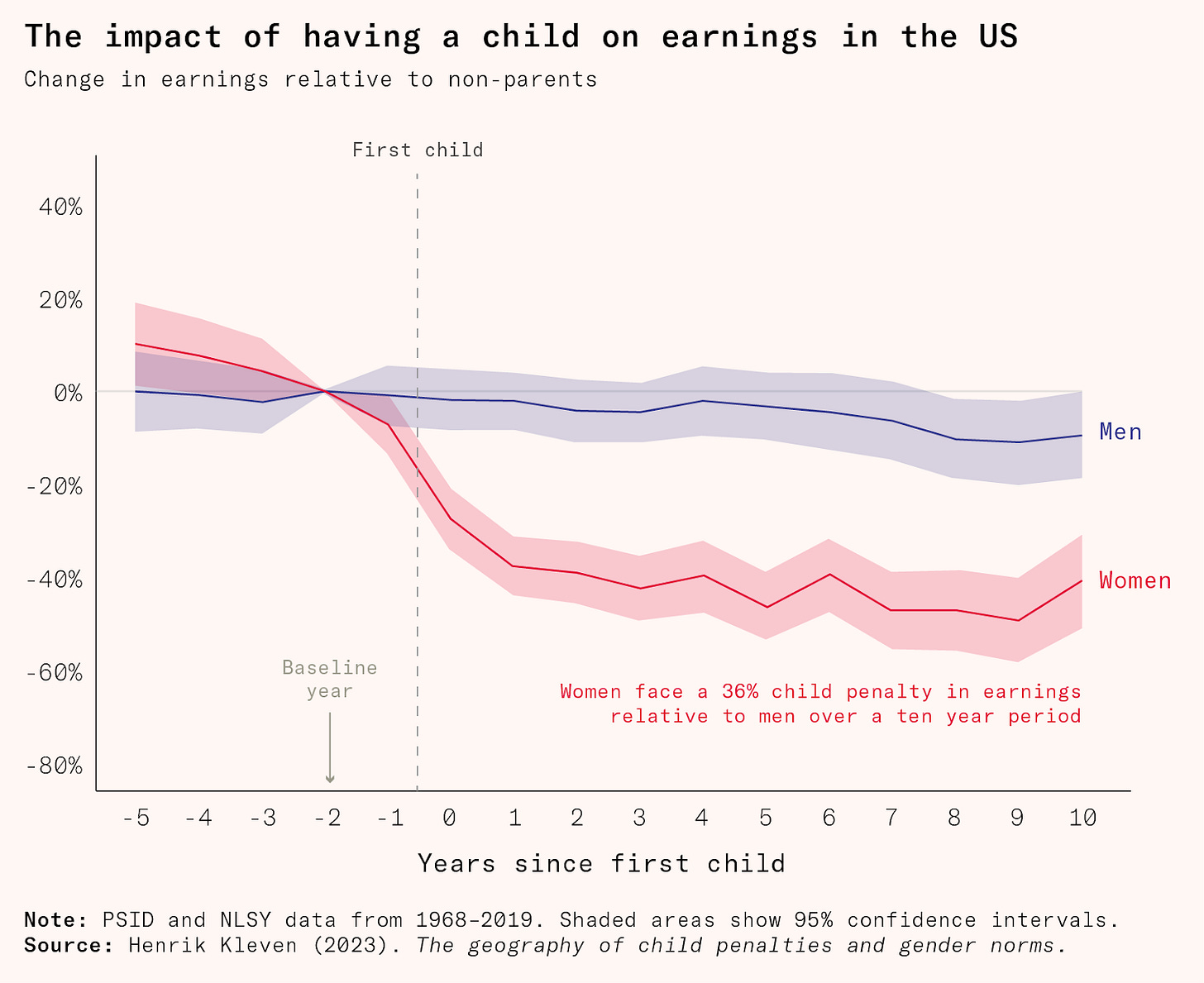Works in Progress published a thought-provoking piece promoting emerging fertility technologies like egg freezing as a solution for the motherhood penalty. The author and genomicist Ruxandra Teslo argues that women would be able to “have it all” when it comes to motherhood and careers if the use of egg freezing becomes more widespread.
The motherhood penalty is a very real private cost associated with having children. Compared to men who have children, women’s wages drop after having children and they never recover. This gap does affect women’s decision making when it comes to having children – where the motherhood penalty is harsher, the birth rate is lower.
Teslo highlights that the later women wait to have their first child the more they earn. When women choose to have children in their twenties and thirties (when they’re the most fertile) they miss out on crucial years of networking, skill building, and experience necessary to climb the career ladder.
Knowing this, women in “greedy careers” – careers that demand more time and pay more per hour to those who work the most – delay pregnancy for as long as possible.
“This is particularly true for women with PhDs or professional degrees. Women without a bachelor’s degree tend to have 1 to 1.5 children on average by age 28, while those with higher educational attainment have around 0.25 children by the same age.”
But the chances of getting pregnant naturally with regular sex falls greatly as women age and the chances of miscarriage rise. These risks have generally meant that women who want biological children must plan to have children early in life, even if it means career sacrifice.
Enter fertility technology like freezing eggs and delaying egg aging. Teslo views technologies like these as the solution to this tradeoff between career and motherhood because they make it easier for women to get pregnant later, meaning women can invest more in their career earlier and choose to have children later with little biological consequence.
“Technological advances that extend women’s fertility windows give women the option to invest in their careers in their thirties and have children later. A hundred years from now, women having children well into their forties may be as commonplace as married women and mothers in the workforce are today.”
I learned a lot from Teslo’s piece. As a genomicist, she knows far more than I ever will about the genetic factors affecting fertility. I also find the potential for fertility technology exciting and important, especially for women in careers that require long amounts of education like medicine or law.
But I can’t help but feel unsatisfied with fertility technology as the solution to the motherhood penalty.
Fertility technology is a great option for those who demand it, but it’s widespread use feels like bowing to the patriarchy. The underlying argument is that women should offset pregnancy – a natural and beautiful function of their bodies – so they can better fit into the demands of the workforce.
It’s unfortunately true that if women “behave like men do” the wage gap between them closes – one study by the Congressional Budget Office found that among people aged 27 to 33 who had never had children, women’s earnings approach 98% of men. It’s also true that only women experience penalties from having children. In fact, fathers tend to experience advantages over childless men, being seen as more committed to their jobs and being offered higher starting salaries.
But these are social problems that are rooted in our disscontempt for motherhood and technology only kicks the can down the road. Yes, offsetting pregnancy can increase women’s lifelong earnings, but she will still experience a motherhood penalty later on and still experience discrimination for being a mother – maybe even more discrimination for being an “older” mother. It’s undoubtedly become easier and safer to be at “advanced maternal age,” deciding to offset pregnancy comes with its own unique set of costs – having less time with children and grandchildren just to name one. Some women are willing to accept these costs, but not every woman will.
I don’t have any doubts that fertility technology will do and has done great things for women’s health and progress. I also fully believe that making it more socially acceptable for women to have children when they’re older is important. What I do worry about is what this does for women who want to have children young, especially those who want to keep working. Are they just doomed to a massive motherhood penalty?
The solution to the motherhood penalty should work for all women and honor what makes women unique from men. While closing these penalties will require cultural changes and technological advancements, expanding flexible work opportunities is another key way the motherhood penalty can be lessened.
One Canadian study showed that when women have access to flexible work the motherhood gap closes. The researchers found that flexible work reduced the motherhood penalty by 68%, while the ability to work from home reduced the gap by 58%. When companies had more flexible arrangements, they also tended to be less concerned about the ability of mothers to do well at work. This shows that the problem isn’t with the women themselves, but with how the workforce views mothers.
Changing the culture is hard and indeed not every woman will be able to work flexibly, which is why these technological innovations should be paired with cultural changes in the labor market and beyond. Any woman who wants to have children should be able to do it when and how she wants, without facing penalties on the labor market.
If the only solution we can see for social problems is making women more like men, we should be worried. Women face economic penalties not because they have kids, but because of how the workforce treats mothers. Delaying having children is a workaround, not a fix.







The notion that “feminine characteristics” should be valued equally relative to “masculine characteristics” seems correct. But what if the competitive pressures of certain industries (investment banking, politics) are such that “masculine traits” like working inflexible hours, being aggressive and disagreeable predict success?
Couldn't agree more. Thank you for writing this!